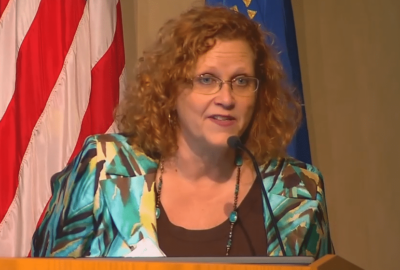

Federal employees might be teleworking, and they're finding ways to get the job done. Federal health-related agencies are at the forefront of the coronavirus...
Best listening experience is on Chrome, Firefox or Safari. Subscribe to Federal Drive’s daily audio interviews on Apple Podcasts or PodcastOne.
Federal employees might be teleworking, and they’re finding ways to get the job done. Federal health-related agencies are at the forefront of the coronavirus battle. Among them, the National Institutes of Health. For a status report, the Federal Drive with Tom Temin turned to the director, Dr. Francis Collins.
Interview transcript:
Tom Temin: Dr. Collins, good to have you on.
Dr. Collins: Glad to join you in this very unusual time.
Tom Temin: And as the director of NIH, you two are teleworking, correct?
Dr. Collins: I am. I’m sitting in my home office in Chevy Chase where I expect to be holed up for the foreseeable future, trying to be a good role model for all those other people that we have asked to go home and work from there and avoid social distance violations and pretty much try to limit the spread of this illness.
Tom Temin: Now one of your institute directors, Dr Fauci, seems to be everywhere on every news outlet there possibly can be. What’s it like to watch him take the lead like that?
Dr. Collins: Tony is a hero for all of us. He’s been through many of these infectious disease crises, beginning with HIV/AIDS and going through many others since then. He has the expertise. He has the ability to communicate clearly and accurately. He is the truth teller that everybody needs to hear from right now. So I’m thrilled that he is on the task force and his getting all these opportunities to talk to the public about what we know and what we don’t know.
Tom Temin: Now is Infectious Diseases the only institute that is on this case or do you have other parts and pieces too?
Dr. Collins: Oh, there’s a lot of NIH engaged in this. Certainly people like the bioengineering folks are very much focused on what could be done here in terms of new technologies. There’s a lot of epidemiologists in various institutes that are doing mapping. There are people who are expert in trying to do better diagnostics. All of those things gonna brought together. I’m gonna have a three hour meeting virtually, of course, on Wednesday of all of the NIH institutes, to be sure we’re capturing all the bright ideas that are circulating there about things that could be done to help with this pandemic.
Tom Temin: Now the campus in Bethesda is a really big place. Anyone that drives through there sees the traffic pour out of there almost every hour. What are most of the people at NIH doing in terms of where they’re working right now?
Dr. Collins: Well, because of the concern about not contributing to the spread of the disease, we’ve sent everybody home as of today who was not involved in patient care because we do have a hospital there. Of course, we need to take care of those patients safely, and we’ve also allowed people who are working with animals to come in and take care of them. But we also have a vaccine research center, which is a hotbed of a lot of what’s going on right now to try to develop a vaccine for coronavirus.
And those folks are hard at work, pretty much 24-7 trying to accelerate the pace of vaccine development, which is going really well right now. But still, we’re probably a year away from something that would be available for the rest of the world to be able to take advantage of, and we want to shorten that time as much as we can. So but otherwise our little city there, which has about 30,000 people, they’re all pretty much doing what I’m doing back at home, working on their laptops. Oh my gosh, doing a lot of conference calls and Zoom calls and web axis trying to keep the mission going but not being on site.Tom Temin: And those people working on the virus vaccines, they are in their labs, correct?
Dr. Collins: They are. We felt that that was such a high priority that those people should continue to working with alldue speed. But people who are not working on bench research that is directly relevant to COVID-19, we felt it was better for them to close down and at home until this passes, which may be many weeks or even months.
Tom Temin: But what about scientists that may have live experiments going that are not coronavirus or virus vaccine related, but still are something that has to be tended to like animals but maybe without animals?
Dr. Collins: This is part of the painful result of where we are right now,. We still had to ask those scientists to figure out a way to close down what they’re doing. Freeze down cells, figure out if there’s a time to experiment, get that last time point and then close the door and walk away. We will allow people only to be there briefly for what you’d call minimal maintenance. Making sure the freezers are working, for instance. So we don’t lose precious materials. But at a time like this, where the national priority has to be that the most rigorous kind of social distancing to keep the spread from going any faster, we had to be part of that too, and as painful as it was asking these postbacs and postdocs and senior scientists to close their lab doors and walk away, we had to say that. And if you looked around the NIH today, you would see a whole lot of empty labs
Tom Temin: And of course, NIH has many thousands of grantees doing scientific work. And assuming those institutions are under the same structures, what kinds of flexibilities for grantees are you? Are you trying to effectuate?
Dr. Collins: Of course, that’s a very important point because most of the NIH resources don’t get spent in Bethesda, they go out to all those institutions around the country that are our grantees and they’re working hard in many different areas. For those that are working on coronavirus, we hope they are moving forward with all due speed. But for many universities that have otherwise decided they need to close down their efforts. Scientists not working on coronavirus are for the most part being sent home just like we’re doing here. We’re trying to be as flexible as possible with our grantees, recognizing that this is going to result in a slowdown in the search productivity, that grant deadlines may need to be readjusted, that supplements might need to be applied for people who were running clinical trials that are not gonna be able to enroll patients for a while. All of those things are going to be difficult, painful and expensive. But it’s the right thing to do right now to sort of protect the public, which is what we need to be part of.
Tom Temin: Is there any possibility that a grantee that is not working on directly on this particular virus issue but has the capability of doing it, is there any flexibility under law that they could repurpose the grant money and get started joining the coronavirus fight?
Dr. Collins: We would be totally open to that. We have had some requests for what you call administrative supplements of that sort. I know of at least a couple instances where people who have the skill set that might be necessary to apply to coronavirus but hadn’t been working on it are now doing just that and are being allowed by their universities to stay vigorously active in the lab. So, yeah, we want to be encouraging off those kinds of innovative ideas and not get in the way
Tom Temin: And the course CDC is the other big piece of HHS that is working on coronavirus, and FDA, for that matter. What grade of contact are you having with your counterparts at CDC and FDA?
Dr. Collins: Oh, almost daily at the staff level and occasionally at the top level. I had long talk
with Steve Hahn of the FDA yesterday. We certainly have, more than ever, the reasons to be linked up in a synergistic way. I’m glad to say that we have over the course of the last 11 years that I’ve been a NIH director, built really strong relationships with FDA and the CDC, and with CMS, where I run Joint Leadership Councils with their directors, and we make sure that all of our senior staff are thinking about ways that we can do things together, that we can’t do separately. So I think we’re in a good place to build on that platform, that foundation of trust and knowledge of each other’s agendas. And we need that right now more than ever.Tom Temin: And with everybody teleworking and people monitoring and in touch with their contractors and their grantees, How’s the bandwidth holding up? How’s your IT infrastructure for supporting all of this telework and telemedicine and everything else?
Dr. Collins: That’s a great question, Tom, because this is stretching some of the things that we used to take for granted. But now, when you try to put thousands of people onto the same conference call, it can be a problem. We actually stretched that system in quite an interesting way last Thursday. I decided that I wanted to run a town hall meeting virtually for the entire NIH staff, and that could be as many as 40,000 people when you add up the contractors. We were pretty sure of that the systems that we had used before would not be able to handle that. So we brought in a new kind of software that Cisco said they had used in places like General Motors and Visor. And we mounted that we put on a one hour conference call with visuals involving me and several other speakers. At one point, we had 23,000 people listening simultaneously who sent us in 1900 questions during the course of the hour, and it went flawlessly as far as the technology. So that was a relief to know that it is possible for me to be able to communicate with all of my staff, even at this difficult time.
Tom Temin: And I guess in that home study, the guitar is probably a pretty good occasional companion to hunt to relieve stress.
Dr. Collins: Yeah, I think we all need something to help us unwind a little bit were sequestered here at home. The Four walls seem to be closing a little bit, and for me, certainly the music is a big part of that. The guitar and the piano are my friends. And the other is that motorcycle in the garage, and I will confess I’ve been out on it a couple times in the last week being careful, of course, not to be close to anybody, but it does seem like we all have to do something to try to get our minds working. And even though we’re socially distant, I hope that’s really more than weird. Physically distant, we should try to remain socially connect.
Tom Temin: Dr. Francis Collins is director of the NIH. Thanks so much for joining me.
Dr. Collins: Glad to. We are all going to get through this, but it’s going to be a long road.
Copyright © 2025 Federal News Network. All rights reserved. This website is not intended for users located within the European Economic Area.


